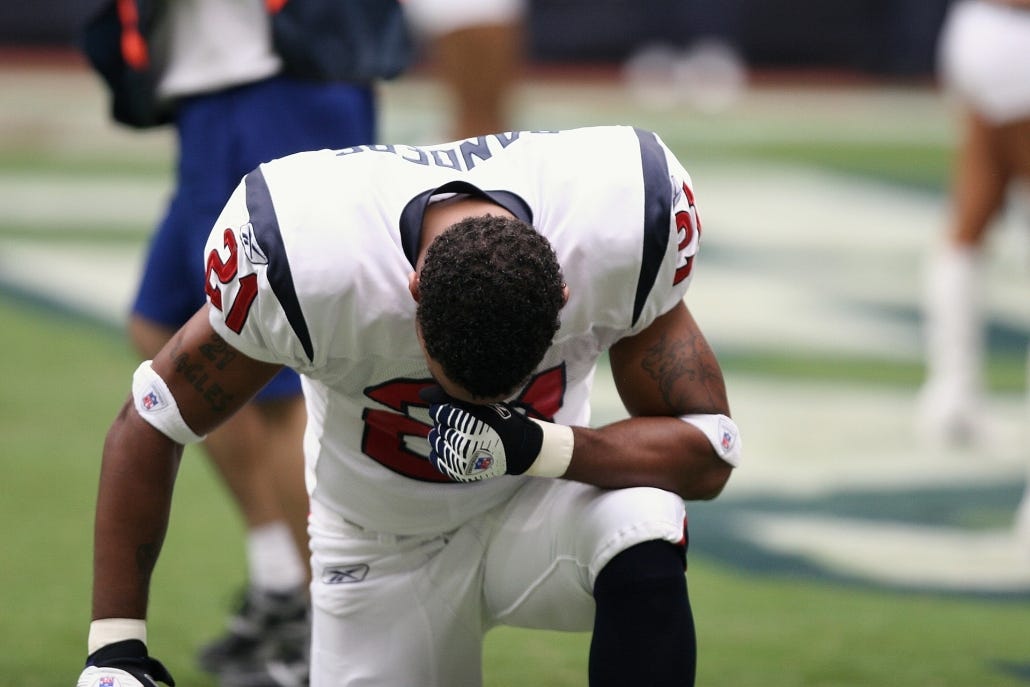Not today…
History – as the old adage goes – belongs to the victors.
Plato explained why: “Those who tell the stories rule society.”
The resurgence of the “Take a Knee” campaign, or whatever they call the #ClusterFoxtrot that has ruined professional sports, prompted an acquaintance of mine to ask if I would ever kneel while the National Anthem played. She believed this to be a rhetorical question, and was very pleased when I began shaking my head, signaling my eventual “no” response. Her body language changed a bit however, when I continued:
“I would not kneel during the National Anthem for the same reason I would not fly a Confederate flag.”
“Ok, that’s great,” she said puzzled, and skedaddled, lol.
I’ll explain here what that means, but first, here’s what it does not mean:
It does not mean that I have blind faith in or blind allegiance to government. #Eyeroll
It does not mean that I’m some latent racist and supporter of slavery. #BiggerEyeroll
What it means rather, is that the National Anthem and Confederate Flag have evolved to represent very particular, profound, imperishable ideas to the majority of the American people, and perhaps we should be mindful of their evolution.
*****
To even consider a time when slavery was tolerated let alone commonplace, is mind-boggling in the 21st Century, whether considering the Jews in Egypt, abandoned children & conquered people groups in Rome, or Africans in New England and Virginia. More confounding is that the phrase “All men are created equal, endowed by their Creator with certain inalienable rights…” didn’t initially apply to slaves in America, anymore than it applies to the unborn now.
While not a popular fact, it is true nonetheless that the hostilities between the northern and the southern sections were more complex than one issue. Otherwise, Lincoln’s promise to the south that slavery could continue on his watch would’ve satisfied their angst, and Lincoln knew why it didn’t: westward expansion would continue to threaten the balance of power in Congress, which in turn would direct economic policies (e.g. protective tariffs) that would unequally burden the agrarian south to the benefit of the industrial north, and of course, the question of secession all of a sudden became taboo for the first time since our secession from Mother England…
Two things can be true at the same time: the south could have been dead on balls accurate about states rights and secession, but fatally and woefully wrong about slavery, which was 100% in the DNA of that conflict. In 1861, however, even Abraham Lincoln knew – perhaps better than most in the north – that the Confederate flag was not sown and flown solely to represent pride and love for slavery…
…but that is what the Confederate flag has come to symbolize to the majority of Americans, and for that reason, I would not fly the confederate flag – though I hate ceding historical and intellectual ground – lest I inadvertently devalue another person’s humanity.
The story of Francis Scott Key’s experience that inspired his poem “The Defense of Fort McHenry” in 1814 is well known, so I will not recount every detail here, rather in summary note that the composition was about a specific, harrowing September night two years into the War of 1812, when Key and two others, were detained on their truce ship in Chesapeake Bay, having successfully negotiated a friend’s release (and inadvertently learning of the British plan to attack Ft. McHenry). For hours, Key watched British “bombs bursting in air.” As darkness fell, he was certain the Fort would be taken. He later wrote: “It seemed as though mother earth had opened and was vomiting shot and shell in a sheet of fire and brimstone.”
After hours of bombardment, uncertainty and despair, when the smoke cleared, as Key plainly wrote, the “Star-Spangled Banner was still there…” which meant that the War for Independence fought just a few decades earlier, was still won.
Quite ironically, it was Lincoln’s War that increased the patriotic popularity of Key’s poem and accompanying tune in the north, which became even more widespread when the military adopted and required the tune to be played during the raising and lowering of the colors in the 1890s…
So the Anthem was not originally written as a tribute to all who serve in the military, first responders, their respective veterans and fallen…
…but that is what the National Anthem has come to symbolize to the majority of Americans, and for that reason, I would not kneel as it plays – as frustrated as I get with undeclared & unconstitutional wars – lest I inadvertently devalue another person’s humanity.
*****
At the end of the day, history is an ongoing, often gut-wrenching but always fascinating saga of the human condition. Even more reason to preserve, dissect and discuss it without prejudice. Some of the most amazing moments I’ve experienced while teaching, occurred in an historical rabbit hole assessing what was done well, what was not done well, why and how the result could be improved upon should a similar situation occur in the future.
One thing is certain… If we continue to erase the good, the bad and the ugly from our history, not only will the absence of that evidence ensure that we repeat it, but also the absence of lessons learned will make it much less likely that the American experiment survives the remedial course.
Rest assured that America’s enemies – both foreign and domestic – have known that longer than you and I have been alive…
“That men do not learn very much from the lessons of history
is the most important of all the lessons that history has to teach.”
~Aldous Huxley





